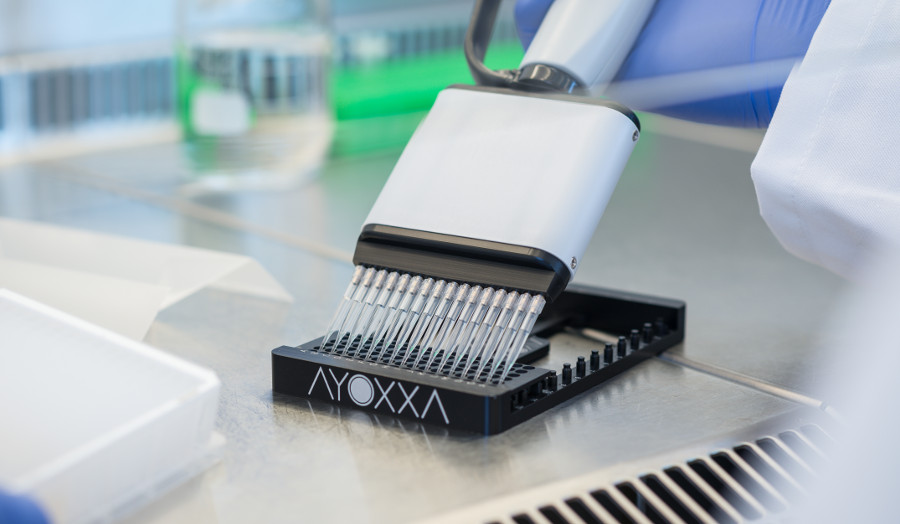
Insight into biomarkers
AYOXXA's LUNARIS platform:?In a case study "Translational proteomics: a new perspective for
ophthalmology research, Ayoxxa gives insights into the capabilities of its Lunaris multiplex protein
analysis platform.
Up to 80% of people who have suffered from diabetes for 20 years or more are afflicted with diabetic retinopathy (DR), which is the leading cause of blindness through damage to the retina. The longer a patient suffers from diabetes, the higher the risk to develop DR. It has been estimated that up to 90% of new cases could be eliminated or reduced in severity, if reliable screening tests were available. By being integrated into routine screenings, such tests could help to identify initial signs of retinopathy as early as possible and help physicians to initiate the right treatment in time.
Inflammation and vascularisation play a significant role in ophthalmic diseases and reliable monitoring techniques are required for the analysis of related biomarkers from vitreous and aqueous humor of diabetes patients. However, samples from such sources are limited and current proteomic biomarker detection methods require relatively large sample volumes, which in some patients may be difficult to obtain without having to undergo a vitrectomy. This is where AYOXXA’s innovative automated beads-on-a-chip multiplex protein analysis system kicks in. LUNARIS assays can be performed with sample volumes as low as 3µl – which represents about 1/10 of the volume required by comparable multiplex technologies.
Assays for translational research
But this is not the whole story. Scientists in clinical laboratories who correlate proteomic interactions to pathogenesis in various fields, including ophthalmology and immunology, need to build on a robust and reliable platform. To transfer lab findings through to validation in clinical trials, the platform needs to deliver scalability, flexibility and robust data quality.
AYOXXA’s LUNARIS system combines the advantages of a bead-based multiplexing approach plus the reliability and scalability of a plate-based format with the simplicity of image-based analysis. The system is comprised of a dedicated reader, automated analysis software, and a growing portfolio of LUNARIS multiplex protein assay kits for the detection and quantification of soluble inflammation and immune-response markers.
Highest quality of data through superior accuracy and precision
AYOXXA offers a variety of disease related panels, including the newly introduced LUNARISTM Human 11-Plex Ophthalmology Kit for the detection of the most important biomarkers for age-related macular degeneration and diabetic retinopathy. Additionally, AYOXXA offers the LUNARIS Mouse 12-Plex Th17 Kit to help elucidate Th17 cell biology in murine models of autoimmune disorders and immune mediated conditions.
Image-based readout combined with the planar beads-on-a-chip format make the LUNARIS system very robust and capable of delivering best-in-class data quality. The spatial separation of the individual coated beads in a pre-defined array help to avoid quenching effects and to reduce artifacts due to potential bead clumping, ensuring the best possible accuracy and precision. The readout captures an image of all of the thousands of beads within the reaction well, leaving no bead unread. This exhaustive sampling, combined with robust plate-based workflow, helps achieve coefficients of variation (CVs) in the range of 10% or better.
Flexibility in scalability and formats
LUNARISTM BioChips have been designed as a modular system with formats from 32- to 384-well density and are compatible with liquid handling system integration, allowing full scalability for low- to high-throughput applications. LUNARIS
has proven to be highly efficient for multiplex immunoassays – which are the primary format commercially available today. However, the system can potentially also be used for other binding or capture assays in the same modular plate-based format.
Researchers in academia and in leading pharmaceutical companies have already tested thousands of samples using LUNARISTM and have found the assays enable their research. The superior features make LUNARIS an ideal choice for state-of-the-art biomarker screening and validation.



 adobe.stock.com - ipopba
adobe.stock.com - ipopba BioDlink
BioDlink